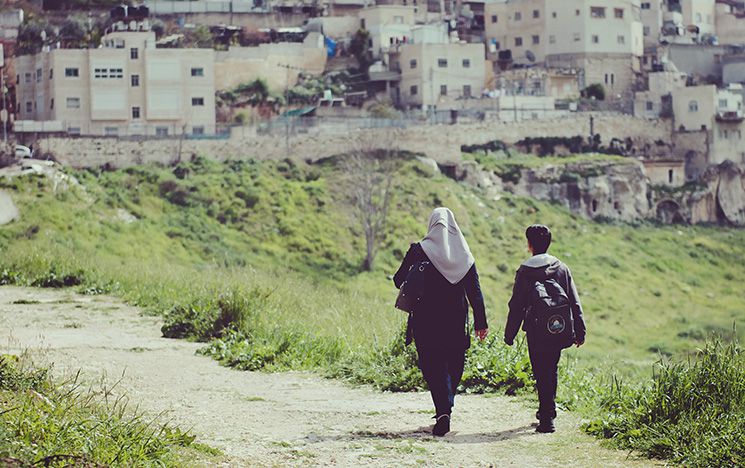Mobility and return
Research on migration, mobility, return and reintegration at the SCMR analyses the evolution of mobility processes and aims to achieve a deeper understanding of migration and return migration dynamics and their interaction with broader processes of globalization and development.
 Walking along a path to a Palestinian refugee settlement (Photo: Mossholder, 2019)
Walking along a path to a Palestinian refugee settlement (Photo: Mossholder, 2019)
Mobility and return
Read more below about selected current and past projects on migration, mobilities and return migration.
- Excellence in Migration and Integration Research and Networking (MIRNet)
Estonia is one of the smallest countries in the EU, but has one of the largest percentages of foreign-born population as well as emigration levels per capita.
In this societal context, the overall objective of this project is to establish Tallinn University (TU) as an internationally-renowned centre of expertise on migration and migrant integration issues, in cooperation with three internationally leading counterparts: the University of Sussex, Roskilde University and the University of Tampere.
Read more at the European Commission website.
Funder: European Union Horizon 2020
SCMR people: Russell King, Michael Collyer, Laura Moroşanu, Farid Miah
Partners: Roskilde Universitet; Tallinn University; Tampere University
Project dates: 2019-2023
- Returning to Debt: The Effects of Indebtedness on Reintegration
This mixed methods study analyses returnees’ and their households’ experiences with debt in five countries (Bangladesh, Cameroon, El Salvador, Ghana and Iraq). The research analyses reintegration outcomes according to three dimensions (economic, social and psychosocial) and contextualizes the experiences of returnees within their households and communities.
The research focuses on how debt acts as a barrier to, or at times facilitates, opportunities for returnees’ sustainable reintegration, as well as ways in which it constricts returnees’ ability to cope with reintegration challenges. Additionally, the research examines how debt can damage returnee households’ capacity to support returnee reintegration.
Read the project report on the IOM's Migrant Protection Platform
Funder: IOM
SCMR people: Ceri Oeppen
Partners: Samuel Hall, IDS, IOM
Project dates: 2022
- Mentoring Returnees: Reintegration Outcomes
The project analyses the outcomes of the IOM's ORION returnee mentoring programme on return migrant reintegration in three countries - Guinea, Morocco, and Senegal - combined with data analyses from 14 additional countries.
The results of this research highlight the interconnectedness of reintegration dimensions, with the economic dimension being foundational, while social and psychosocial support are needed to consolidate and sustain reintegration gains. Psychosocial support cannot be considered an ‘optional extra,’ rather it is a crucial component to a healthy and sustainable reintegration process. Mentoring of returnees has a small but positive effect on obtaining better reintegration outcomes. This early success and trust built by ORION mentors could be expanded in IOM's reintegration programming.
Read the project report on the IOM's Migrant Protection Platform.
Funder: IOM
SCMR people: Ceri Oeppen, Michael Collyer, Russell King
Partners: Samuel Hall, IOM
Project dates: 2020
- Youth Mobility: Maximising Opportunities (YMOBILITY)
A large-scale study that offered important insights into the main features of youth mobility within Europe. Policy and action recommendations include migrant support initiatives at national and regional levels for cultural and labour market integration as well as enhanced public awareness.
Read the project results brief
Read more at the European Commission website.
Funder: European Union Horizon 2020
SCMR people: Russell King, Laura Moroşanu
Partners: Sapienza Innovazione Consorzio, Italy; Universitaet Bielefeld, Germany; Universidad de Almeria, Spain; University College Cork, Ireland; Latvijas Universitate, Latvia; Universitatea din Bucuresti, Romania; Malmo Universitet, Sweden; Centrum Spolocenskych a Psychologickych Vied Slovenskej Akademie Vied, Slovakia; University of Surrey, UK
Project dates: 2015-2018
- Temporary Vs Permanent Migration (TEMPER)
The TEMPER project provided a comprehensive assessment of the pros and cons of initiatives to promote circular migration, as an alternative to more traditional forms of temporary and permanent migration. These initiatives often rely on a poor understanding of the reasons why some migrants spontaneously return and circulate, and others do not.
The work in TEMPER was focused on sending areas, namely: Eastern Europe (Romania, Ukraine), Latin America (Colombia, Argentina), Sub-Saharan Africa (DRC, Ghana, Senegal), North Africa (Morocco). The destination countries under analysis were: France, Italy, Spain and UK.
Read more at the Population Europe website.
Funder: European Union
SCMR people: Michael Collyer
Partners: Consejo Superior De Investigaciones Científicas (Csic); Institut National D’etudes Demographiques (Ined); Universidad Complutense De Madrid (Ucm); Centro De Estudios De Población (Cenep); University Of Bucharest (Ub); Ptoukha Institute For Demography And Social Studies; International Training Centre, International Labour Organization (Itc-Ilo); FI2NET
Project dates: 2014-2018
- Possibilities and Realities of Return Migration (PREMIG)
The PREMIG project investigated return migration from Norway and the United Kingdom; it was premised on the idea that the possibility of return - not just actual return - is an important phenomenon.
Return migration has many faces: for some migrants it is a dream that they hope to realize. Others live in fear of being returned against their will. PREMIG took a broad approach and covered diverse aspects of return migration.
Read the PREMIG Project final report.
Funder: Norwegian Research Council
SCMR people: Ceri Oeppen, Paul Statham
Partners: Peace Research Institute Oslo (PRIO), Statistics Norway.
Project dates: 2010-2015